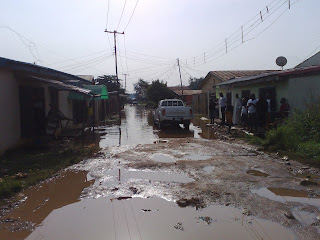Six months ago on Saturday I stepped off the plane at 6am into a warm dawn in Abuja. Since then I’ve survived a journey through the Delta, a flood on my street, had malaria twice, avoided a baby trying to wee on me, made plenty of other babies cry, travelled to Bauchi, Kano, Calabar and Abuja, attended workshops, run my own workshops and generally settled into work and living in Nigeria. This feeling at home didn’t come easily, and the other VSOs, my colleagues and neighbours have really helped the process . However I wouldn’t say I’ve achieved much work wise in six months, so the next six will be critical in ensuring I’ve really achieved something and made a difference at Hope for the Village Child when I leave at the end of February next year. Watch this space for more information on what I’m actually doing at work, and what Hope for the Village Child does.
As if to celebrate my mile stone, this week the power company workers went on strike. Nigeria has a population of 150 million people and is one of the world’s largest oil producers, but only creates enough power for a city the size of Bradford. The power company has long been the subject of derision among Nigerians, and most people own generators to cope with the frequent power cuts. Formerly called the National Electric Power Authority, Nigerians fondly referred to it as Never Expect Power Always. Recently it became the Power Holding Company of Nigeria Plc, aka Problem has changed name, please light candle.
We’re quite lucky in the area we live in and we usually get around 7 hours of power a day, more in rainy season because much of the power is hydro electric so more is created. Although I’m writing this in the dark, we’ve had power all day, and I’m hoping it will come back this evening. But even when there is power the levels can be unpredictable, earlier in the year my laptop charger was destroyed by a high voltage surge at 5am.
As a result of their general inability to create power, when the workers went on strike last week, most people didn’t notice for about 24 hours! I was working at home, and used up two laptop batteries, one phone battery and two power monkey/gorilla charging devices before I started to wonder if there was a problem. When I arrived at work the next day with all my devices ready to be charged from the generator I was told there was a strike. The thing I hadn’t realised was that if there’s no power, there’s also no water, as power is needed to pump water into each house. This was actually more of a problem than no power, flushing the toilet takes up a lot of water, and I had a mountain of clothes which needed to be washed let alone washing myself. Luckily my land lord has large buckets full of water for these kind of situations and I was able to borrow from him for the three days it took the water to return. To help the shortage I tried to eat out as much as possible to avoid washing up, which was a very effective solution for me.
In total we didn’t have power for around 48 hours, and water for about 3 days, I can’t imagine what would happen if there were no water and no power at home for that long, but here everyone is completely prepared for it because they’re used to getting poor public services. Luckily now we’re back to normal ad hoc power and water levels again, so to celebrate I’m watching season 1 of glee in the wrong order! (That’s the way the dvd came).








